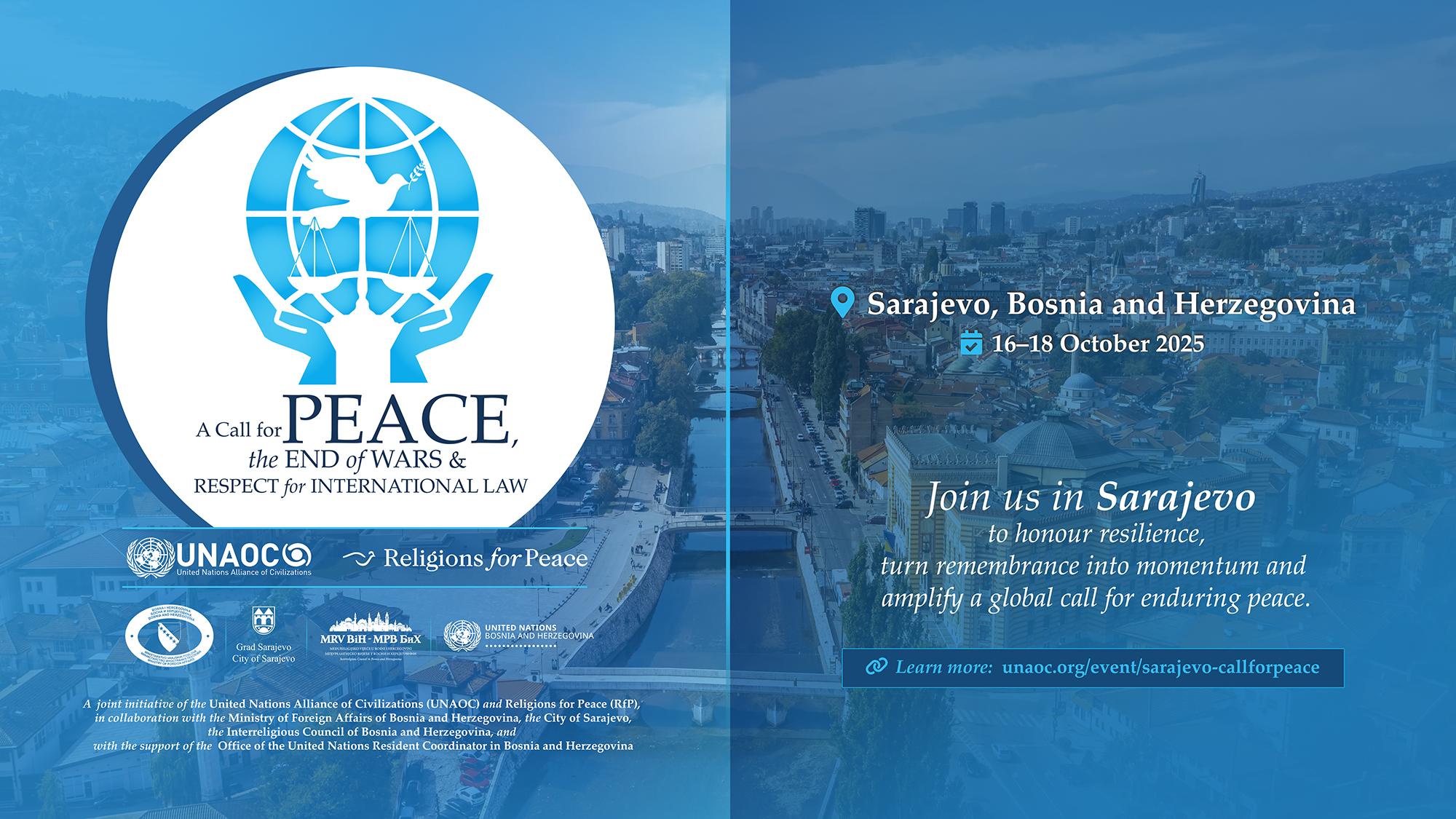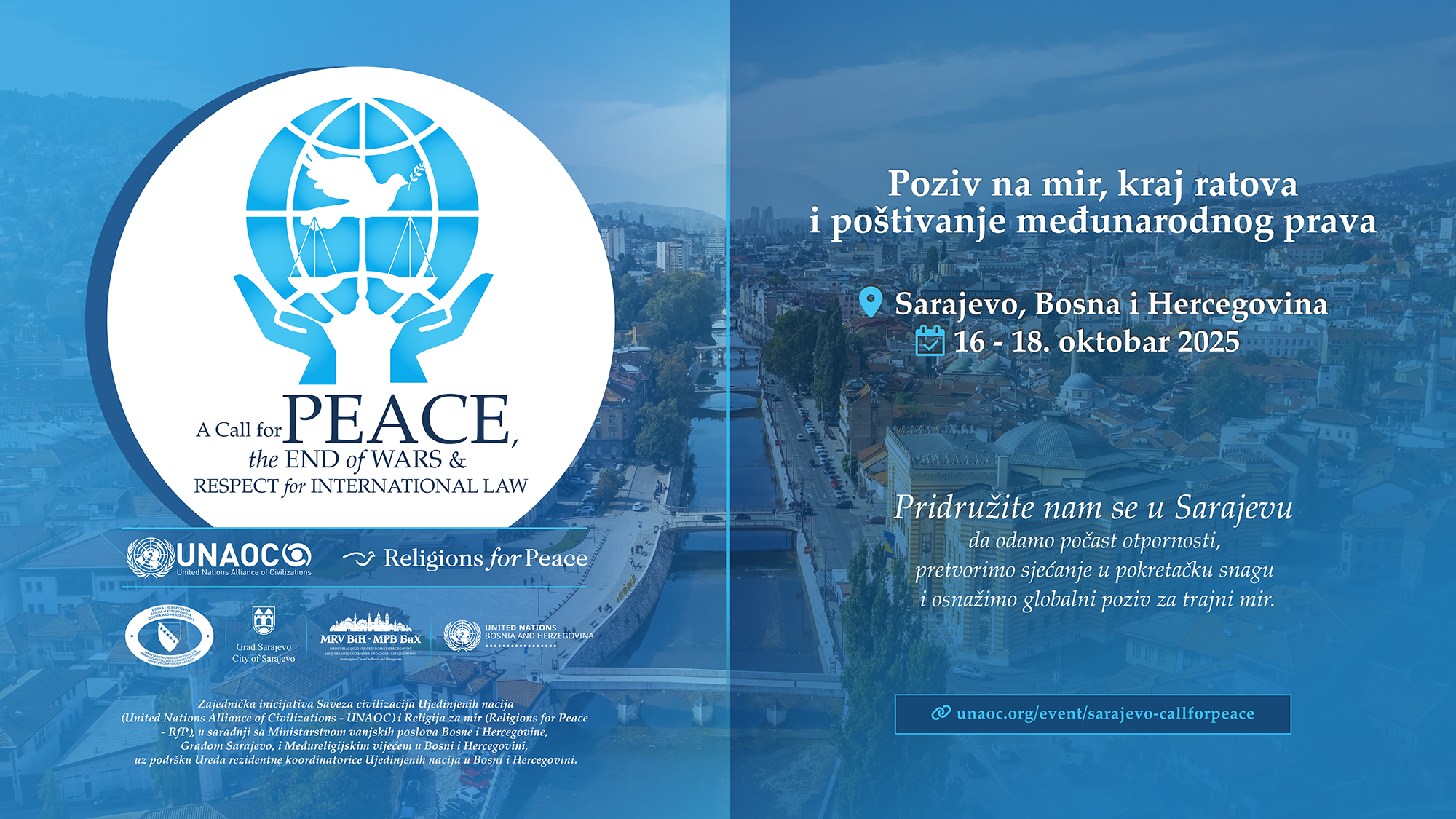
- This event has passed.
A Call for Peace, the End of Wars and Respect for International Law — Sarajevo, Bosnia and Herzegovina
October 16, 2025 - October 18, 2025
| Sarajevo, Bosnia and Herzegovina
Event Navigation

A joint initiative of the United Nations Alliance of Civilizations (UNAOC) and Religions for Peace (RfP), in collaboration with the Ministry of Foreign Affairs of Bosnia and Herzegovina, the City of Sarajevo, the Interreligious Council of Bosnia and Herzegovina, and with the support of the Office of the United Nations Resident Coordinator in Bosnia and Herzegovina
Background
Throughout history, humanity has faced numerous cycles of confrontations, wars, and conflicts, leaving a painful legacy of violence. Despite the efforts of such visionaries as Emmanuel Kant and Victor Hugo, who advocated for peace in the 18th and 19th centuries, conflicts have persisted, culminating in catastrophic events such as World Wars I and II, which claimed millions of lives and shattered entire societies.
The aftermath of these horrors led to the establishment of the United Nations (UN) in 1945, with the primary aim of promoting global peace and security. However, in recent decades, humanity has witnessed an alarming setback with the resurgence of unresolved conflicts and the emergence of new tensions around the world. Moreover, a growing culture of militarization overpowered the culture of peace. The growing despair of citizens across the globe in the face of these tragedies have intensified, highlighting the urgent need for a profound paradigm shift towards peace.
The Initiative: A Call for Peace, the End of Wars and Respect for International Law
In response to this global crisis, the United Nations Alliance of Civilizations (UNAOC) proposed the creation of an “Alliance for Peace,” during its 9th Global Forum in Fez, Morocco, which was then reaffirmed at its 10th Global Forum in Cascais, Portugal, in November 2024.
In this context, UNAOC and Religions for Peace have jointly committed to co-organizing the launch of “A Call for Peace, the End of Wars and Respect for International Law” — aiming to amplify their condemnation against war while fostering a message of peace and upholding respect for international law. A symbolic launch of the initiative took place in Gernika, Spain, in April 2025, on the 88th anniversary of its bombing. The initiative will continue with a series of major events in historically bombed cities highlighting the devastating consequences of war.
The two-day Gernika gathering featured interactive discussions and poignant interventions from political leaders, government officials, religious leaders, youth advocates, civil society representatives, and various stakeholders—all championing the cause of peace.
Sarajevo: A City’s Resilience as a Call for Global Action
Sarajevo embodies the profound intersection of history, resilience, multicultural harmony and reconciliation. Marked by its role in the outbreak of World War I and the trauma of its 1990s siege, the longest in modern European history through the 20th century, the city carries a unique legacy that powerfully illustrates both the immense human cost of war and the enduring hope for peace.
The city of Sarajevo holds a unique and poignant place in world history. In June 1914, the assassination of Archduke Franz Ferdinand in Sarajevo ignited a chain of events that led to the outbreak of World War I—a devastating global conflict claimed millions of lives and left deep scars on the international community.
A century later, Sarajevo was again thrust into the global spotlight during the Bosnian War of the 1990s, enduring the longest siege of a capital city in modern warfare. The city became a symbol of resilience and unyielding human dignity in the face of suffering.
Against this historical context, Sarajevo stands today as a living reminder of the need and urgency behind the initiative “A Call for Peace, the End of Wars, and Respect for International Law.”
Sarajevo’s identity as a city at the crossroads of civilizations is deeply embedded in its diverse urban fabric and rich cultural heritage. For centuries, it has served as a meeting point between East and West. Furthermore, the convergence of Catholic, Jewish, Islamic and Christian Orthodox traditions within a single urban space has fostered a unique spirit of dialogue and mutual respect. Its multiethnic and interfaith character, coupled with its ongoing reconciliation efforts, offers a powerful platform for advancing global dialogue on peacebuilding, inclusion, and the rule of law. It is a city that speaks with authority about both the costs of division and the power of unity and diversity.
This landmark event is the second iteration of the initiative “Call for Peace, End of Wars and Respect for International Law ”, launched in April 2025 in Gernika, Spain—a city, like Sarajevo, whose name is synonymous with civilian suffering caused by war. As in Gernika, the Sarajevo gathering seeks to draw historical parallels to modern-day conflicts and to amplify global voices calling for peace, unity, and justice. This chapter of the initiative is organized in collaboration with the Ministry of Foreign Affairs of Bosnia and Herzegovina, the City of Sarajevo, the Interreligious Council of Bosnia and Herzegovina, and with the support of the Office of the United Nations Resident Coordinator in Bosnia and Herzegovina.
The gathering will feature dynamic dialogues and powerful contributions from political leaders, government officials, religious figures, youth advocates, civil society actors, and other key stakeholders, all united in advancing the global agenda for peace.
16 October:
Welcome Reception (by invitation only)
Venue: Olympic Museum
17 October: Interactive Roundtables
9:00 AM – 11:00 AM: Interactive Roundtable: Faith in Action: Religious Leaders and Faith Actors as Partners in Fostering Peace, Rebuilding Trust and Promoting Mutual Understanding
Venue: Gazi Husrev-beg’s Library
11:30 AM – 12:30 PM: Interactive Roundtable: Young People Paving the Way for Peace: from Words to Action
Venue: Bošnjački institut
3:00 PM – 4:15 PM: Interactive Roundtable: Women Shaping a Future of Peace: Bridging Gaps in Global Challenges
Venue: Venue: Bošnjački institut
4:30 PM – 5:45 PM: Agents of Peace: Civil Society Driving Transformative Change from the Ground Up
7:30 – 9:30 PM: Concert and Dinner (by invitation only).
Venue: The Army Hall
18 October:
12:00 – 2:00 PM: Main Ceremony: A Call for Peace, the End of Wars and Respect for International Law
Venue: Sarajevo City Hall – Vijećnica
An Urgent Call to Action
“A Call for Peace, the End of Wars, and Respect for International Law” is an urgent call for humanity to put an end to the vicious cycle of violence and destruction that has pervaded in recent history. By uniting global stakeholders and engaging communities most affected by conflict, this initiative aims to amplify the pursuit of a peaceful future for the next generations. Through diplomacy, collaboration, and dialogue, it envisions a world where peace prevails over war.
Objectives:
- Raise global awareness: Emphasize the urgency of ending wars and violent conflicts while upholding international law.
- Mobilize Stakeholders: Engage religious actors, civil society, governments, international organizations, and key stakeholders to promote peaceful solutions to international conflicts.
- Counter Militarization: Establish a united front against the influence of the military lobby, advocating for a “peace lobby” that promotes the peaceful resolution of conflicts.
- Promote the role of women, youth, and sports: Highlight their essential role in the prevention and resolution of conflicts.
- Strengthen international commitments and reaffirm the United Nations’ role in fostering and building peace.
- Change the global narrative: Foster a shift in the global narrative around violence and militarization, promoting peace as a tool for development, stability, and human well-being

